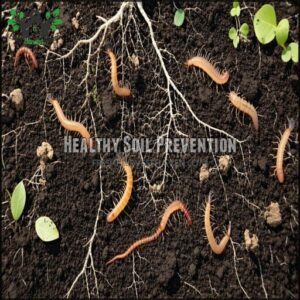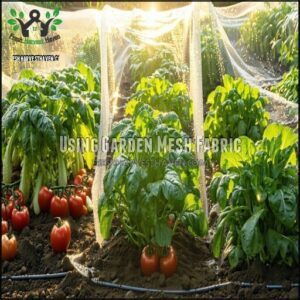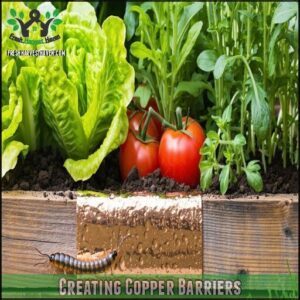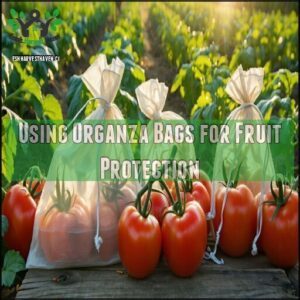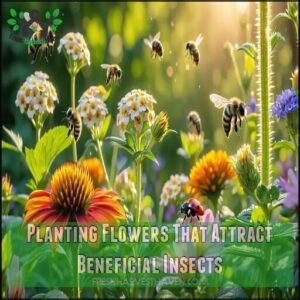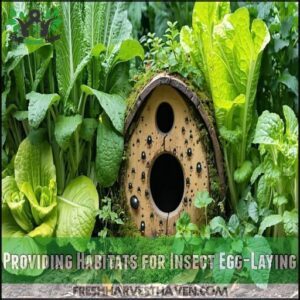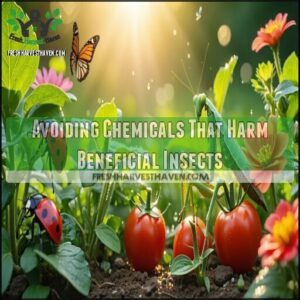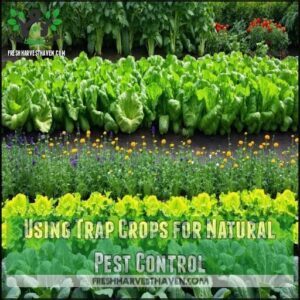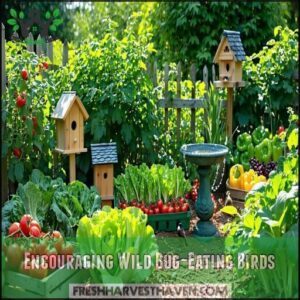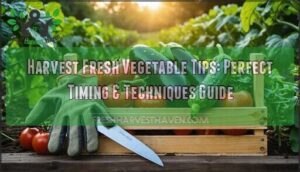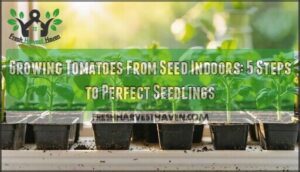This site is supported by our readers. We may earn a commission, at no cost to you, if you purchase through links.
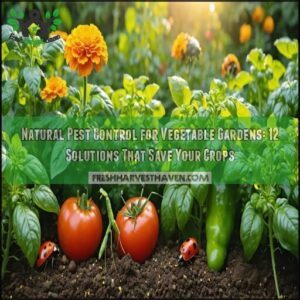 You can win the battle against garden pests without harsh chemicals.
You can win the battle against garden pests without harsh chemicals.
For natural pest control in vegetable gardens, try companion planting with marigolds and basil to repel unwanted insects. Introduce beneficial predators like ladybugs and praying mantises to hunt down aphids and caterpillars.
Neem oil works wonders as a natural insecticide, while diatomaceous earth creates a deadly barrier for crawling pests. Don’t forget simple physical barriers—row covers protect young plants when they’re most vulnerable.
A healthy soil ecosystem is your best defense, creating plants strong enough to withstand minor pest pressure. Nature’s pest management toolkit is both powerful and surprisingly sophisticated, and using it can help you achieve natural pest control in your garden, making it a great way to maintain a healthy garden ecosystem with beneficial predators and companion planting.
Table Of Contents
- Key Takeaways
- Natural Pest Control Methods
- Healthy Soil Prevention
- Physical Barriers Control
- Attracting Beneficial Insects
- Frequently Asked Questions (FAQs)
- What is the best natural pesticide for vegetable gardens?
- What home remedy kills bugs in a vegetable garden?
- How do I keep my vegetable garden pest free?
- Does vinegar keep bugs off vegetable plants?
- How do I get rid of bugs in my vegetable garden naturally?
- What is the best pest control for vegetable gardens?
- What is a natural pesticide for vegetable gardens?
- How do you control insect pests in a vegetable garden?
- How can I protect my garden from pests?
- What is the best natural pest control method?
- Conclusion
Key Takeaways
- You can effectively control garden pests using natural insecticides like neem oil and spinosad, which target harmful insects while being gentler on beneficial ones.
- Your soil’s health serves as the first line of defense—rich, nutrient-dense soil with beneficial microbes creates plants with stronger natural resistance to pests.
- You’ll prevent pest damage by installing physical barriers such as garden mesh, row covers, copper tape, and organza bags that block pests from reaching your vegetables.
- You’re creating a natural pest control army when you attract beneficial insects and birds to your garden through companion planting, providing habitats, and avoiding harmful chemicals.
Natural Pest Control Methods
You’ll find that natural pest control methods work just as effectively as chemical alternatives, without putting your family or beneficial garden visitors at risk.
From organic sprays that target specific pests to earth-friendly powders that create protective barriers, these solutions let you fight garden invaders while keeping your vegetable patch truly organic.
1. Organic Spinosad Garden Insect Spray
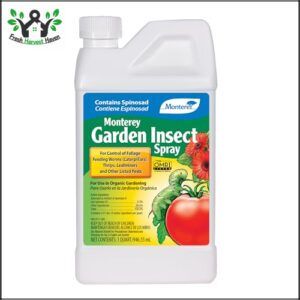
Spinosad, the garden superhero derived from soil bacteria, packs a powerful punch against vegetable garden pests while being gentler on beneficial insects. You’ll love its effectiveness on those leaf-munching troublemakers in your garden.
It’s also important to note that healthy soil practices can improve plant immunity.
The key benefits of using Spinosad include:
- Controls caterpillars, beetles, thrips, and leafminers that destroy crops
- Works through both contact and ingestion, with ingestion being 5-10x more effective
- Remains effective for up to 3-4 weeks, outlasting Bacillus thuringiensis
- Apply in late afternoon for best results when bees aren’t active
- Is OMRI-listed for organic gardening with minimal environmental impact
2. Natural Pyrethrin Insect Concentrate Spray
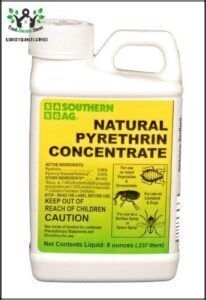
Nature’s knockout punch comes from pyrethrin, derived from chrysanthemum flowers for powerful vegetable garden pest control.
You’ll get fast results when using this natural insecticide properly. Apply as spot treatments for best results.
| Pest Type | Pyrethrin Effectiveness | Application Timing |
|---|---|---|
| Aphids | Immediate knockdown | Evening (protect bees) |
| Beetles | High control rate | After rain |
| Leafhoppers | Quick results | When first spotted |
| Mosquitoes | Excellent repellent | Dusk application |
| Caterpillars | Moderate control | Before damage spreads |
The application timing is crucial for effective pest control, with considerations such as evening application to protect bees, and dusk application for mosquitoes.
3. Neem Oil Spray for Plants
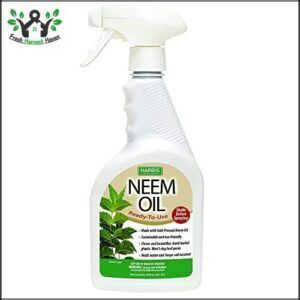
Harnessing the power of neem oil gives your plants a fighting chance against stubborn pests.
This organic pest control champion works by disrupting insect feeding and reproduction cycles.
You’ll want to mix 2 teaspoons with a quart of water and a drop of dish soap for safe concentrations.
Apply every 7-14 days, being mindful of plant sensitivity—some veggies can’t handle neem’s potent punch.
The spray effectiveness peaks when used consistently.
4. Diatomaceous Earth Natural Pest Control Powder
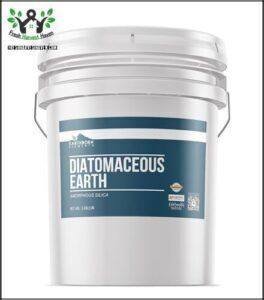
If you’re looking for a microscopic hero in your garden, diatomaceous earth (DE) might be your answer.
This fine powder, made from fossilized algae, works like tiny shards of glass to insects but remains completely safe for humans.
When applying food-grade DE, sprinkle it lightly around plants after rain.
It’s effective against crawling pests like slugs and beetles but won’t harm earthworms.
Remember, DE application needs renewal after rainfall.
Healthy Soil Prevention
You’ll find that rich, nutrient-dense soil acts as your garden’s first line of defense against pesky invaders, creating plants with natural resistance to common pests.
Just like how eating well keeps you from catching every cold that goes around, your veggie plants will stand stronger against bugs when they’re growing in soil that’s alive with beneficial microbes and packed with the right nutrients, which helps them have natural resistance to common pests and makes them stand stronger.
Benefits of Composting
Now that you’ve explored natural pest control methods, let’s talk about your garden’s best defense system – composting! Your compost pile isn’t just a way to handle kitchen scraps; it’s a powerhouse for soil enrichment and organic pest control.
Compost introduces beneficial microbes that actually suppress pests and diseases while improving water retention. Plants grown in compost-amended soil develop stronger natural defenses against troublemakers like aphids.
Plus, you’ll be reducing waste by recycling up to 30% of your food scraps! To further improve your soil, consider that organic matter is essential for water retention and feeding microorganisms.
Natural Fertilizers for Soil Health
While composting creates garden gold, natural fertilizers take your soil health to the next level.
They’re your secret weapon in natural pest control by strengthening plants from the roots up.
Here’s what works best in vegetable gardens:
- Worm castings release nutrients slowly while improving soil structure
- Compost tea delivers beneficial microbes directly to plant roots
- Bone meal provides phosphorus for strong root development
- Green manure crops add nitrogen when turned into soil
- Seaweed extracts offer trace minerals plants crave
These organic soil amendments create an environment where plants thrive and pests struggle, making them a key part of soil health and plant development.
Preserving Soil Structure With Aeration
Oxygen-starved soil creates a welcome mat for pests.
By aerating your vegetable gardens regularly, you’ll break up soil compaction and boost microbial activity.
This simple step improves water infiltration and root growth while inviting earthworms to do their magic underground.
Think of aeration as your garden’s revitalizing boost—it’s a cornerstone of organic pest control by maintaining a thriving garden ecosystem where healthy soil naturally discourages troublemakers, and provides a thriving garden ecosystem.
Avoiding Chemicals That Harm Beneficial Organisms
Now that you’ve improved your soil’s breathing ability, let’s protect the tiny heroes living in it.
Chemical pesticides are like throwing a grenade at an ant – they kill everything, including your garden allies!
Here’s what happens when you ditch harmful chemicals:
- Beneficial insects like ladybugs and lacewings stick around to eat pests
- Natural predators maintain ecosystem balance without your intervention
- Pollinators keep your vegetable production booming
- Soil microorganisms continue their invisible work building soil health
- Earthworms happily aerate and enrich your soil naturally
Physical Barriers Control
You’ll save countless garden battles by setting up physical barriers that literally block pests from reaching your precious vegetables.
These simple shields—like garden mesh, row covers, copper tape, and organza bags—create a protective fortress around your plants without chemicals, letting you enjoy the satisfaction of outsmarting those hungry critters before they can even say "lunch.
This approach allows for a simple and effective method of pest control, utilizing materials like copper tape to deter pests.
Using Garden Mesh Fabric
Garden mesh fabric is your vegetable garden’s invisible shield.
Simply drape this lightweight material over plants to create a physical barrier that blocks pests while letting in sunlight, water, and air.
It’s like giving your veggies their own protective bubble!
Different mesh fabric types offer varying levels of protection, from fine netting for tiny insects to sturdier options for larger pests and weather protection.
These fabrics, like Agribon Row Cover, can also act as insect netting to provide additional protection for your garden.
Installing Row Covers
Row covers serve as your garden’s invisible shield against unwanted visitors. They’re incredibly versatile for vegetable pest control without chemicals.
When installing row covers, remember these four key steps:
- Choose the right material (lightweight for summer, heavier for frost protection)
- Secure edges with soil or pins
- Leave slack for plant growth
- Install before pest problems begin
Different row cover types suit various plant compatibility needs and weather considerations. You can find a variety of options online to help with row covers and garden protection.
Creating Copper Barriers
While row covers shield plants from above, copper barriers create a ground-level defense system that slugs simply can’t stomach.
When a slug touches copper tape, it receives a tiny electric shock—like touching a 9-volt battery with your tongue.
Install copper tape (at least 3 inches wide) around raised beds or containers, ensuring it stays clean to maintain effectiveness.
Consider using various widths available for different applications.
For maximum slug control, combine with other vegetable pest protection methods to create a comprehensive defense system against these pests, utilizing copper tape as a key component.
Using Organza Bags for Fruit Protection
While copper barriers keep crawling pests at bay, sometimes your fruits need their own personal bodyguards.
Organza bags offer elegant protection for your precious produce.
These lightweight fabric shields are a game-changer for garden pest control:
- Choose appropriate bag size (2-10 inches) depending on your fruit types
- Slip bags over developing fruits after pollination to prevent damage
- Secure with drawstrings to guarantee complete coverage
- Remove occasionally to check fruit development
- Wash and reuse yearly for cost-effective organic pest control
By following these steps, you can ensure your fruits are well-protected with personal bodyguards and enjoy a bountiful harvest using organic pest control methods.
Attracting Beneficial Insects
You’ll be amazed at how your garden’s pest problems can vanish when you invite nature’s tiny helpers to the party.
By adding specific flowers and creating cozy habitats for ladybugs, lacewings, and predatory wasps, you’re basically hiring a free, 24/7 pest control service that works while you sleep.
Planting Flowers That Attract Beneficial Insects
While barriers can keep pests out, inviting nature’s pest patrol in offers a smarter solution.
Plant flowers like sweet alyssum to attract hoverflies whose larvae munch on aphids. Ladybugs flock to plants with small flat blooms like dill and yarrow.
Mix in zinnias, echinacea, and borage to welcome beneficial insects year-round. You can find various flower options to attract these insects.
Remember, those little flower-shaped landing pads aren’t just pretty—they’re your garden’s natural defense system!
Providing Habitats for Insect Egg-Laying
Beyond planting flowers, creating egg-laying shelters is like rolling out the welcome mat for beneficial insects.
You’ll want to focus on host plant selection that supports the full lifecycle of helpful bugs.
Leave some leaf litter in garden corners, add small beneficial bug houses, and incorporate larval food sources throughout your space.
This habitat diversity creates a balanced insect ecosystem where natural predators can thrive, boosting your garden’s biodiversity and natural pest control capabilities.
Avoiding Chemicals That Harm Beneficial Insects
Now that you’ve created homes for your garden allies, let’s keep them safe.
Those store-bought chemicals might promise pest-free gardens, but they’re equal-opportunity killers—wiping out your beneficial insect workforce too.
To maintain ecosystem balance while protecting pollinators:
- Choose natural insecticides like neem oil that target specific pests
- Spray during evening hours when beneficial insects are less active
- Use spot treatments rather than blanket applications
- Create chemical-free zones where natural predators can thrive
- Wash plants with plain water to remove pests before reaching for stronger solutions
By following these steps, you can ensure a healthy ecosystem and protect your garden from harm, while also preserving the natural balance of your outdoor space.
Using Trap Crops for Natural Pest Control
While protecting beneficial insects, you can also employ a clever pest control strategy: trap crops.
These "sacrificial plants" act as decoys, luring garden pests away from your prized vegetables. Blue Hubbard squash works wonders for attracting squash bugs and cucumber beetles.
For effective companion planting, dedicate 10-20% of your garden to these pest magnets.
To further enhance this strategy, consider planting umbelliferous flowers to attract beneficial insects that prey on the pests drawn to the trap crops.
The best part? Pests gather in one spot, making targeted vegetable pest management much easier.
Encouraging Wild Bug-Eating Birds
While trap crops distract pests, your garden’s best defenders might be flying overhead.
Birds are nature’s pest control specialists, happily feasting on insects that damage your vegetables.
Turn your garden into a bird-friendly habitat and watch your pest problems diminish.
- Install nesting birdhouses near (but not directly above) your vegetable beds
- Add a bird bath to provide fresh water, essential for attracting wild birds
- Choose native plant selections that produce berries or seeds as additional food sources
- Create "bug zones" with leaf litter where birds can hunt for garden pests
Frequently Asked Questions (FAQs)
What is the best natural pesticide for vegetable gardens?
While chemical sprays promise quick fixes, nature offers better solutions.
You’ll find neem oil spray works wonders in your garden.
It’s effective against multiple pests but won’t harm beneficial insects or your veggies.
What home remedy kills bugs in a vegetable garden?
A soap spray with 1 tablespoon dish soap and 1 quart water will zap most garden bugs on contact. You’ll get instant results without harming your veggies or the environment.
How do I keep my vegetable garden pest free?
It’s practically impossible to have a completely pest-free garden.
You’ll have better success using physical barriers like mesh covers, encouraging natural predators, planting companion herbs, and using DIY sprays when needed.
Does vinegar keep bugs off vegetable plants?
Vinegar can help deter some bugs from your veggie plants.
Mix equal parts water and white vinegar in a spray bottle, but don’t go overboard—too much acid might harm your plants!
How do I get rid of bugs in my vegetable garden naturally?
A whopping 80% of organic gardeners rely on natural predators.
You’ll succeed by using beneficial insects, companion planting, neem oil sprays, and physical barriers.
Regular inspection and healthy soil maintenance prevent most infestations naturally.
What is the best pest control for vegetable gardens?
Garden mesh fabric is your best bet—it keeps bugs out while letting sunlight in.
For specific pests, try companion planting, homemade soap sprays, or inviting natural predators like birds to your garden.
What is a natural pesticide for vegetable gardens?
DIY insect sprays are a million times better than harsh chemicals.
You can make effective solutions using dish soap, garlic, neem oil, or essential oils.
They’ll protect your veggies without harming beneficial insects or your health, which makes them a million times better and a great way to use neem oil.
How do you control insect pests in a vegetable garden?
You’ll want to introduce beneficial insects, apply homemade soap sprays, use physical barriers like mesh, remove pests by hand, and try companion planting.
Regular monitoring helps you catch problems before they become infestations.
How can I protect my garden from pests?
Every cloud has a silver lining when managing garden pests.
Use physical barriers like mesh covers, invite natural predators such as birds, apply homemade soap sprays, and maintain healthy soil to keep your plants protected.
What is the best natural pest control method?
You’ll have better luck using garden mesh as a physical barrier while inviting natural predators like birds and chickens to your garden.
For slugs, try beer traps; for squirrels, peppermint-soaked cotton balls work wonders.
Conclusion
Like a skilled general with multiple strategies, you’re now equipped to implement natural pest control for vegetable gardens.
You’ve learned to combine organic sprays, healthy soil practices, physical barriers, and beneficial insects into a thorough defense system.
By working with nature rather than against it, you’ll enjoy healthier vegetables while preserving your garden’s ecosystem.
Remember, successful natural pest control for vegetable gardens isn’t about eliminating all bugs—it’s about creating balance where your crops can thrive.

